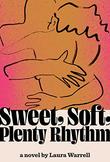Laura Warrell’s first novel, Sweet, Soft, Plenty Rhythm (Pantheon, Sept. 20), follows jazz trumpeter Cyrus “Circus” Palmer as he turns 40 and reckons with a pregnant lover, a teenage daughter, and an assortment of other women “who are dazzled, confounded, exasperated, or obsessed with him,” as our starred review says, calling the book “a captivating modern romance evoking love, loss, recovery, and redemption.” Warrell answered our questions by email.
What kind of research did you do for Sweet, Soft? Are you a musician yourself?
One of my regrets is not taking my piano lessons more seriously. (My mother was right!) I know my way around the keys, but I’m by no means a musician, so I wanted to unlock what I see as the mystery of the musician’s creative process. How does the muse come to musicians? What’s happening inside of them as they compose and play? What do the instruments feel like in their hands? How are they able to translate whatever they’re feeling or thinking into a language the rest of us can experience on a deeply visceral level?
My primary sources were books by authors who spoke directly to jazz musicians, like Coltrane or Armstrong. I also talked to the musicians in my own life. For instance, a friend of mine is a drummer, and I watched him play one day and kept stopping him to ask questions: What words would you use to describe the sound of the snare, what are you thinking about as you play, are you hearing the other instruments accompanying you in your head?
Do you listen to music while you’re writing?
 Absolutely! Usually, I can’t listen to music with lyrics, and when I listen to jazz I get caught up in the intricacies of the sound, so my playlists include lots of downtempo music and acid jazz, which I like because many of the tunes follow a groove that keeps the creative juices flowing but doesn’t distract me.
Absolutely! Usually, I can’t listen to music with lyrics, and when I listen to jazz I get caught up in the intricacies of the sound, so my playlists include lots of downtempo music and acid jazz, which I like because many of the tunes follow a groove that keeps the creative juices flowing but doesn’t distract me.
For Sweet, Soft, I had playlists for each character, so when I worked on an individual chapter, I’d listen to those songs to get into that character’s headspace. Sometimes the lists were made up of music I thought the characters would like. For instance, Pia, Circus’ ex-wife, likes The Cranberries, Jewel, and other ’90s-era female crooners. Other times, I listened to music that, to my mind, “sounded” like the characters.
What books were formative for you when you were young?
As a teenager, I went through simultaneous phases with Toni Morrison and Jack Kerouac, which might sound strange, but which I think makes sense. What I loved about both of them, and my love for Morrison endures, was the musicality of their prose, the diction, the abstraction grounded in the concrete. I found both of them to be poets as well as superb storytellers, and I aspired to their greatness.
What book do you absolutely love that is not as well-known as it deserves to be?
Rather than a specific book, I have a writer for whom I’d love to go to bat. I discovered Javier Marias when I was living in Spain. His work is incredibly dense and profoundly intellectual—intimidatingly so—but he’s a master storyteller who’s able to weave tantalizingly bizarre plots with deeper meditations on the human experience. Tomorrow in the Battle Think on Me is a great place to start. It’s about a man who hopes to start an affair with a woman, but when he goes to her house, she dies in his arms. For the first 40 or so pages, we watch him experience this bizarre, heavy situation, which is a long time to linger in one moment. This is what makes Marias so amazing to me; those 40 pages are riveting.
Laurie Muchnick is the fiction editor.



































